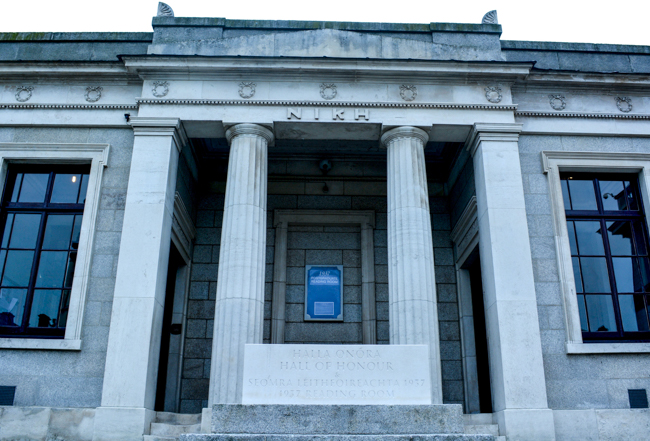Doing a PhD is nothing like I imagined it would be. Studying for my final-year exams, I’d conjured up the image of a sort of utopian existence for myself, nestled alone in some dark recess of the Berkeley Library, left to my own devices for four years, after which I would eventually emerge with my historical masterpiece. Now in my third year of a PhD on Irish kingship and medieval Irish history, I’ve realised the reality of undertaking a PhD in Trinity is nothing like that. Instead, there are checks and balances every step of the way – progress reviews, research and development plans, bibliographies and the like. Actually, they’re not all bad: development plans and the yearly progress reviews have usually helped me to straighten out my thinking on a particular topic and served as a useful tool, giving me a better focus on whatever I was working on. Occasionally, though, they serve as a bit of an unwanted distraction.
It’s not just research and development plans that intermittently disrupt one’s work. You will have to attend classes (in my case, on Latin, old Irish and on the study of old manuscripts), seminars and, indeed, prepare seminar papers. This last exercise is an important one. Delivering papers in front of an audience (albeit not a terrifically big one in my case) might sound a daunting task, but you get used to it after a while. It’s a necessary evil: you get the opportunity to announce to the world that you exist, to let others know what it is you are researching.
On the whole, delivering a seminar paper or talk is a rewarding experience and, for the most part, the feedback you get is constructive and given in good spirit. You will, on occasion, meet an individual who will relish the prospect of watching you squirm, of knocking you and your work or of just blabbering aimlessly and not actually asking a proper question. Thankfully, I am not speaking from experience here – any feedback I’ve ever received has been wholly constructive. Nasty people are a fact of life, unfortunately, and don’t exist solely in academia, so don’t let that sway you.
You will be spending a lot of time thinking about your topic so you should choose something you are truly in love with, not something that will simply “do”
One thing that might deter you, though, are job opportunities, or the lack thereof. Let’s face it: medievalists aren’t exactly in hot demand right now. So, it’s as well to accept this right from the start. Furthermore, I don’t think it’s worth your while deciding upon an area of research purely because it is more likely to get you a job. Employment will be hard to come by regardless. So, I would simply say to study whatever it is you love the most. You will be spending a lot of time thinking about your topic so you should choose something you are truly in love with, not something that will simply “do”.
There will be times – not all that infrequent – when you will become utterly fed up, when you feel your work is useless, when you feel that you are incapable of bringing the project to completion, when you feel that everything that can be written about your subject area has been written. If you aren’t totally obsessed with your subject matter the doubts that play on you will become all the more regular and all the more acute.
Being a PhD student is a strange existence, particularly if your research is funded. My research is fully funded, thankfully, making the exercise easier and more affordable. I don’t want to sound ungrateful – I’m lucky, and I know I am – but the research sort of becomes a very strange sort of job. Your time is your own, within reason, and yet there is no cut off point at the end of the day. You find yourself asking: when is enough enough? All my friends work in “real” jobs and clock off each day. If I decide to knock off at 4pm or 5pm or 6pm I often think: “I should really still be in the library.” This might seem like a strange complaint, but it can be tough to get the work/life balance correct. Oh, and prepare to be utterly envious of all your friends with real jobs making good money and getting on with their lives.
Nasty people are a fact of life, unfortunately, and don’t exist solely in academia, so don’t let that sway you
As I’ve said, there are times when you simply lose faith in your own ability to bring the project to fruition. Actually, that happens quite a bit, and the answer I give to “How’s the PhD going?” varies from week to week (or even from day to day!). It’s all part of the process: you accept it and deal with in the way you would with any other daily frustration. You forget about it, you meet your friends or family and vent over a coffee, or you go and play football or watch a movie or whatever you enjoy doing. Life is full of little annoyances and frustrations. You just have to take a break and keep on chugging. Conversely, one of the most calming things of all is when you meet a fellow postgraduate and you have a good laugh at how useless or how utterly screwed you both are. There’s great comfort in knowing that others are going through the exact same emotions that you are. At least, I’ve always taken great solace from it.
I don’t want to portray an overly negative image here, but a realistic one. The lows of doing a PhD are extremely specific and hard to calculate before undertaking it but so are the highs. Despite the difficulties, doing a PhD will nonetheless be the most rewarding and fulfilling – if occasionally frustrating – thing you’ll ever do.







